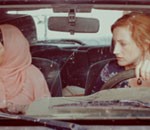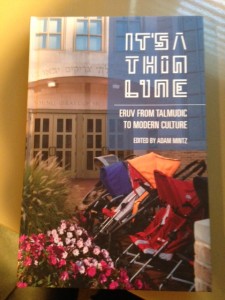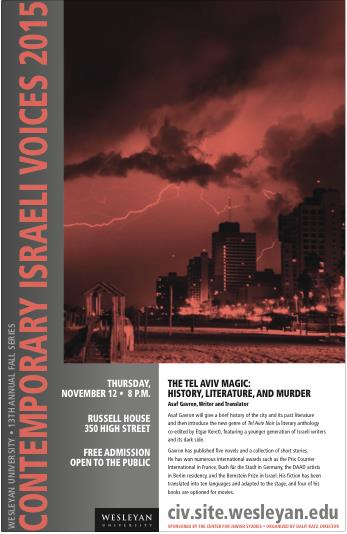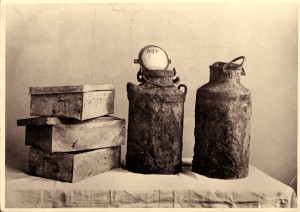Spring semester means the Ring Family Israeli Film Festival, which always happens before the Spring Break and as always was fantastic thanks to Professor Dalit Katz’s curatorship. The festival featured: Fill the Void by Rama Burshstein (2012), Zaytoun by Eran Riklis (2012), By Summer’s End by Noa Haroni, a documentary Six Million and One by David Fisher, and two shorts Wherever You Go by by Rony Sasson Angel and Welcome and Our Condolences by Leon Prudovsky.
Eran Riklis (2012), By Summer’s End by Noa Haroni, a documentary Six Million and One by David Fisher, and two shorts Wherever You Go by by Rony Sasson Angel and Welcome and Our Condolences by Leon Prudovsky.
Since director Haim Tabakman is this year’s Silverberg Distinguished Visiting Scholar, his film Eyes Wide Open was also screened
In the second half of the semester, Jewish and Israel Studies hosts several talks:
Tuesday, April 8, 4:30, 41 Wyllys Room 112: Rabbi Adam Mintz, Ph.D., will speak on “Rabbis and Young Mothers: The Challenges of Adapting Jewish Law to Social Realia.” 
Jewish law finds its roots in the Bible and has slowly evolved and adapted to social, cultural and technological realities. The laws of the Sabbath are a wonderful example of this evolution. How have the laws of the Sabbath developed? This lecture will focus on the question how the laws of the Sabbath have adapted to the changing role of women in the last third of the twentieth century. As women gain a greater voice in society, do their concerns impact the evolution of Jewish law?
Monday, April 28, 2014, 8 pm, Russell House: SAMUEL & DOROTHY FRANKEL MEMORIAL LECTURE, Professor Samuel Kassow will deliver the annual Samuel and Dorothy Frankel Memorial Lecture on “Time Capsules in the Rubble: the Secret Archive of the Warsaw Ghetto.”
Samuel Kassow is the Charles H. Northam Professor of History at Trinity College and a visiting professor of history at Wesleyan University. He is the author of numerous books and publications on east European Jewish history. Most recently he published the award winning “Who Will Write Our History” Rediscovering a Hidden Archive From the Warsaw Ghetto” (2007).
Monday, May 05, 2014, Noon, Allbritton 311: We will venture into the world of science. Dr. Orna Levran P ’09 ’15, the Rockefeller University in New York, will speak on “Race, ethnicity, and ancestry: a medical genetic perspective”

 Interactions between genetic, environmental, and social factors have been proposed to explain the observed differences in disease prevalence and severity among different populations. Populations vary in terms of history (expansion, migration, and natural selection), allele frequencies, and other properties that affect the importance of genetic risk variants. In this talk we will discuss current methods to infer fine personal global ancestry and admixture with examples from several distinctive populations (including Ashkenazi and non-Ashkenazi Jewish cohort) obtained for the study of the genetics of drug addiction. We will also discuss examples of targeting specific groups for prevention and treatment efforts, as well as the reevaluation of the relevance of racial/ethnic labels in the genomic era of personalized medicine.
Interactions between genetic, environmental, and social factors have been proposed to explain the observed differences in disease prevalence and severity among different populations. Populations vary in terms of history (expansion, migration, and natural selection), allele frequencies, and other properties that affect the importance of genetic risk variants. In this talk we will discuss current methods to infer fine personal global ancestry and admixture with examples from several distinctive populations (including Ashkenazi and non-Ashkenazi Jewish cohort) obtained for the study of the genetics of drug addiction. We will also discuss examples of targeting specific groups for prevention and treatment efforts, as well as the reevaluation of the relevance of racial/ethnic labels in the genomic era of personalized medicine.
 Tel Aviv Magic: History, Literature, and Murder, presented by the acclaimed writer Assaf Gavron on Thursday, November 12 at 8 pm at Russell House, concluded the 13th Annual Fall Series Contemporary Israeli Voices, 2016. Assaf Gavron gave a brief history of the city and its past literature and then introduced the new genre of Tel Aviv Noir, a literary anthology co-edited by Etgar Keret, featuring a younger generation of Israeli writers and its dark side.
Tel Aviv Magic: History, Literature, and Murder, presented by the acclaimed writer Assaf Gavron on Thursday, November 12 at 8 pm at Russell House, concluded the 13th Annual Fall Series Contemporary Israeli Voices, 2016. Assaf Gavron gave a brief history of the city and its past literature and then introduced the new genre of Tel Aviv Noir, a literary anthology co-edited by Etgar Keret, featuring a younger generation of Israeli writers and its dark side.






